
There are many factors to consider when selecting a company for environmental consulting. For example, it is important to work with a company that has been certified by the State of Michigan to perform your project. Look for a firm who will take a multidisciplinary approach when solving your problem. A good idea is to seek out references and to negotiate a payment arrangement with your consultant.
Use a certified consultant from the State of Michigan
An environmental consultant is a specialist in environmental compliance. A consultant specializes in a variety of environmental disciplines, including permitting, design, engineering, sampling, and waste management. They work alongside a variety of professionals including lawyers, environmental contractors, manufacturers, and laboratories. IDEM no longer has a database for environmental consultants but provides guidance to help choose the right consultant.

It is possible to have your project managed professionally by an accredited environmental consultant in Michigan. Unlike a consulting firm that doesn't have an experienced team of experts, a licensed environmental consultant can ensure that all aspects of the project are properly addressed.
It is important to find a consultant with a multidisciplinary approach for problem solving
A multi-disciplinary approach is essential when working on sustainability issues. Sustainability solutions require close collaboration among all stakeholders, including scientists, statisticians and politicians. Using a multi-disciplinary approach can help a project to achieve its goal while also building strong relationships among these different groups. Sustainability issues involve complex systems that impact everything, from food to water. These issues require a multifaceted approach that incorporates quantitative expertise, soft and interdisciplinary skills.
Ask for references of previous clients
It is a good idea to inquire about the experience and qualifications of an environmental consultant firm before you hire them. It is important to be familiar with the regulations that govern wetland management in each state and federal. It is important to familiarize yourself with state and local regulations, especially if the consultant isn't from the same state.
If a company cannot provide references, continue looking. Be sure to obtain detailed information on the project team. Do not be tempted to accept the lowest quote; the costs may not be worth the results. Spending time researching the background of your consultants will save you both time and money. Ask for written clarifications if you have any questions about the background of the consultants.

Talk to your consultant about a payment plan
Negotiating a payment plan with your consultant is one of the most important parts of any project. This will allow you to establish a deadline and decide how much you want to charge your consultant. Also, you might want to talk about whether you are willing to pay on a monthly or quarterly basis. Your environmental consultant will need to be paid on time so you can keep up with the project.
FAQ
Who hires consultants
Many organizations hire consultants to assist with projects. These include small businesses, large companies, government agencies and non-profits.
Some consultants work directly for these organizations, while others freelance. The hiring process will vary depending on the complexity and size of the project.
There will be many rounds of interviews for consultants when you are looking to hire. Only then can you select the right person to fill the position.
How much do consultants earn?
While some consultants make $100k+ per year, most consultants only earn between $25-$50k. The average consultant salary is $39,000 This includes both hourly and salaried consultant.
Salary is dependent on experience, location and industry. It also depends on whether the consultant works from home or has a remote office.
Are you a consultant?
Consulting is more than a job that allows you to quickly make money.
Consulting offers various opportunities from project management, business development, strategy, training, and leadership roles. Projects could include small start-ups or large international corporations.
Consulting provides you with the opportunity to develop and hone your skills, as well as gain experience within a range of industries. This could be learning to manage people, write proposals and manage budgets, analyze data and create presentations, or conduct market research.
Do I need legal advice?
Yes! Yes. Many consultants sign contracts without seeking legal advice. This can lead into problems down-the-road. For example, what happens to the contract if the client terminates it before the consultant has completed? What happens if your consultant doesn't follow the contract deadlines?
To avoid any potential problems, it is best to consult a lawyer.
What can I count on from my consultant to help me?
After you have selected your consultant, expect to hear from them within a few business days. They will request information about your company including its mission and goals, products, services, budget, and other pertinent details. Next, they'll provide a proposal describing the scope and estimated time frame, fees, deliverables or milestones, as well as an estimate of costs.
If everything is in order, then the parties will enter into a written contract. The type of relationship between the parties (e.g., employee-employer, independent contractor-employer) will affect the terms of any contract.
If everything goes smoothly, the consultant can begin work immediately. You will have access both to your documents and internal resources and the consultant's skills and knowledge.
Don't think that consultants are experts. To become an expert in any field you consult, it takes practice and effort. Do not expect your consultant to be an expert in every aspect of your business.
Statistics
- So, if you help your clients increase their sales by 33%, then use a word like “revolution” instead of “increase.” (consultingsuccess.com)
- "From there, I told them my rates were going up 25%, this is the new hourly rate, and every single one of them said 'done, fine.' (nerdwallet.com)
- On average, your program increases the sales team's performance by 33%. (consultingsuccess.com)
- According to IBISWorld, revenues in the consulting industry will exceed $261 billion in 2020. (nerdwallet.com)
- WHY choose me: Why your ideal client should choose you (ex: 10 years of experience and 6-week program has helped over 20 clients boost their sales by an average of 33% in 6 months). (consultingsuccess.com)
External Links
How To
What's a typical day like for a Consultant?
A typical day will vary depending on the type of work you are undertaking. But generally speaking, you will spend time researching and planning new ideas, meeting clients, and preparing reports.
You will have many meetings where clients and you can discuss their issues. These meetings can be held over the telephone, online or face-to face.
It is possible that you will be asked to write proposals. These documents outline your ideas and plans, and are required by clients. These proposals will be presented to clients by you and a mentor.
After all the preparation, you'll need to start creating content. This could include writing articles, designing websites or editing photos.
Depending on your project's scope, it may be necessary to do research to get relevant statistics. It may be necessary to know how many customers are currently using your products or services.
Once you have all the information needed, it is time for clients to see your findings. Your findings can be presented orally or written.
You must also follow up with clients following the initial consultation. For example, you might call them periodically to see how things are going or send emails asking them to confirm that they received your proposal.
While this can be a slow process, it's essential to remain focused and maintain good working relationships with clients.